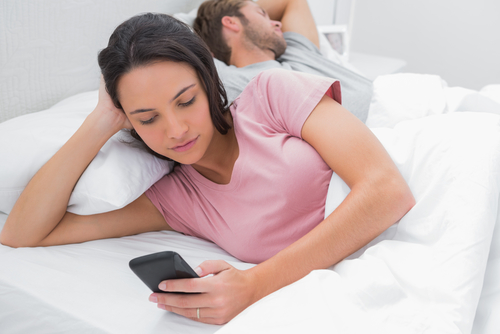Can Late-Night Smartphone Use Reduce Engagement and Productivity?
This is one of our free-to-access content pieces. To gain access to all Ideas for Leaders content please Log In Here or if you are not already a Subscriber then Subscribe Here.

The increasing use of smartphones around the world has led to many organizations endorsing them, and providing them to their employees. However, could there be a downside to the benefit of having instant access to work documents and emails? According to this Idea, late night use of smartphones may interfere with sleep, resulting in employees being less engaged at work the next day. Read on to discover the implications of these findings.
In recent years, extensive management research has focused on the need for sufficient sleep in order to perform better in the workplace. It has been consistently highlighted as one of the most important off-work ‘recovery’ activities, necessary for replenishing an individual’s depleted resources during the working day. However, despite the evidence, many workers are still failing to get enough sleep on most nights and increasingly the reason for this is smartphone use; particularly their use for work purposes through instant access to email and work files. Many people often use their phones for work purposes within an hour of going to bed, and sleeping within reach of smartphones is common practice.
However, in a study led by the University of Florida’s Klodiana Lanaj, late-night smartphone use was found to reduce the amount and quality of sleep, increase fatigue the next morning and, consequently, result in diminished work engagement the next day.
One of the reasons this may be the case was highlighted by Lanaj as the effect of the ‘blue light’ that smartphones emit; “this interferes with the production of melatonin,” says Lanaj, “[which is] a chemical that facilitates falling and staying asleep… Using smartphones for work at night also interferes with employees’ ability to detach and recover from work. Ruminating about impending deadlines or work responsibilities consumes cognitive resources leaving employees more depleted in the morning and less engaged at work the following day.”
Methodology: Lanaj, alongside Russell Johnson and Christopher Barnes conducted two studies. In the first, they examined 82 mid-to high-level managers, measuring their amount of daily smartphone use (for work), sleep quality and quantity, and their level of work engagement the next day.
For the second study, the researchers used survey data from 131 workers to compare the effects of smartphone use on depletion and work engagement with the use of other common technologies (i.e. late-night computer use for work, tablet use for work, and television viewing); smartphone use was more strongly associated with depletion and reduced engagement compared to other electronic devices.
Many organizations make smartphones available to employees, or encourage their use in order to keep them plugged into work when away from the office. Although there are certainly benefits of doing so, such as connection of geographically or temporarily separated individuals, this study shows that such benefits may come at a cost.
As Lanaj, Johnson and Barnes demonstrate, smartphone use at night interferes with sleep and its recovery functions, resulting in the likelihood that those employees will not be fully engaged in their work the next day. In fact, it is not just productivity that takes a hit with inadequate sleep; physiological research indicates significant drops in glucose levels and cerebral metabolic rates in the prefrontal cortex as well. So the long-term health of employees could be at risk too. An awareness of this on the part of managers may help them rethink their expectations of employees being available via their smartphones outside of the office, and during the late evening.
Employees can minimize the negative effects of insufficient sleep themselves as well; a simple solution suggested by the researchers is to fully power off electronic devices after a certain time at night, such as 9pm.

Ideas for Leaders is a free-to-access site. If you enjoy our content and find it valuable, please consider subscribing to our Developing Leaders Quarterly publication, this presents academic, business and consultant perspectives on leadership issues in a beautifully produced, small volume delivered to your desk four times a year.

For the less than the price of a coffee a week you can read over 650 summaries of research that cost universities over $1 billion to produce.
Use our Ideas to:
Speak to us on how else you can leverage this content to benefit your organization. info@ideasforleaders.com